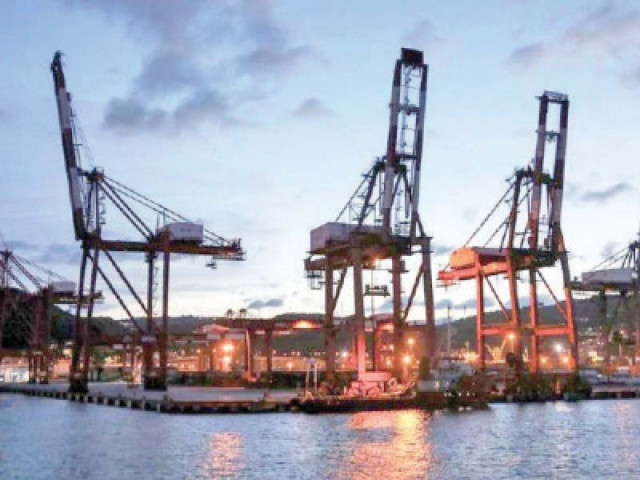Govt to hand over seaports to UAE
Expects to finalise new deal by the end of June 2023

On Monday, Pakistan constituted a negotiation committee to finalise a deal with the United Arab Emirates (UAE) for handing over its Karachi port terminals. This move may mark the first intergovernmental transaction under a law enacted last year to raise emergency funds.
Finance Minister Ishaq Dar chaired the meeting of the Cabinet Committee on Inter-Governmental Commercial Transactions. The cabinet committee decided to set up a committee to negotiate a commercial agreement between the Karachi Port Trust (KPT) and the UAE government, according to the decision.
The negotiation committee has also been permitted to finalise a draft operation, maintenance, investment, and development agreement under the government-to-government arrangements with a nominated agency of the UAE for handing over the Karachi port terminals, as shown in the decision.
The negotiation committee set up to finalise a framework agreement will be headed by the Minister for Maritime Affairs, Faisal Sabzwari. The committee members include the additional secretaries of Finance and Foreign Affairs, the special assistant to PM Jehanzeb Khan, the Chairman of the Karachi Port Terminal (KPT), and the general managers of the KPT.
Pakistan aims to reach a deal to hand over the terminals to Abu Dhabi Ports (ADP), a subsidiary of the Abu Dhabi Ports Group. The UAE government had shown interest in acquiring the Karachi port terminals that were under the administrative control of the Pakistan International Containers Terminals (PICT) last year.
The PICT is a subsidiary of ICTSI Mauritius Limited, with its ultimate parent company being International Container Terminal Services Incorporated, a company incorporated in the Philippines.
Abu Dhabi Ports, part of AD Ports Group, owns or operates 10 ports and terminals in the UAE.
The PICT operated the Karachi terminals from June 2002 for a period of 21 years, which ended last Saturday. However, under the Concession Agreement, the PICT has the first right of refusal subject to certain conditions.
Sources suggest that the PICT may pose legal challenges based on the concession agreement. The company’s CEO was not available for comment.
Last year, the coalition government enacted the Intergovernmental Commercial Transactions Act, aimed at selling state assets on a fast-track basis to raise funds. The country is in dire need of additional money after its deal with the International Monetary Fund (IMF) has lapsed.
Initially, the UAE had refused to provide loans to Pakistan and urged it to sell stakes. However, it later committed $1 billion, which is still undisbursed.
Although the new law provides a fast-track channel to sell the assets, the government may need to engage “transaction advisors or consultants” for price discovery under section 4 (e) of the Commercial Act.
Sources indicate that the government needs to be extra careful when finalising a deal with the UAE, as it will be the first transaction of its kind, and the outgoing operator is also posing some challenges.
Initially, the plan was for the KPT to run these terminals, but the cabinet committee was informed that the KPT does not have the capacity, and the operations of the terminals should be given to the PICT until June 30th.
The government expects to finalise the new deal with the UAE by that time.
A handout from the Ministry of Finance stated that the cabinet committee considered a summary of the Ministry of Maritime Affairs regarding the management of operations of PICT. The cabinet committee was informed that ADP, owned by the government of the UAE, has shown interest in operating the Container Terminal.
The cabinet committee also decided to set up another committee to negotiate the draft framework agreement between the government of the UAE and the government of Pakistan, under the Inter-Governmental Commercial Transaction Act 2022, to further strengthen relations between the two countries in the maritime sector. This committee will be headed by the Secretary of Maritime Affairs.
Sources indicate that the new committee will meet within this week, and there is a possibility that the framework agreement will be finalised at the earliest in order to conclude the deal.
Published in The Express Tribune, June 20th, 2023.
Like Business on Facebook, follow @TribuneBiz on Twitter to stay informed and join in the conversation.



















COMMENTS
Comments are moderated and generally will be posted if they are on-topic and not abusive.
For more information, please see our Comments FAQ